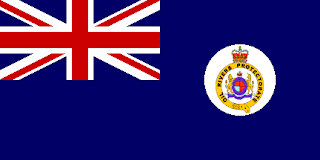The Oil Rivers Protectorate was established in 1884 in the Niger delta in what is modern day Nigeria. The area was called the "oil rivers" because it was once a major producer of palm oil.
British sovereignty over the area was confirmed at the Berlin Conference in 1885 and on 12 May 1893 the protectorate was enlarged and re-named the Niger Coast Protectorate. In 1900 this enlarged protectorate was amalgamated with the southern part of the territory that had been administered by the Royal Niger Company to form the Colony and Protectorate of Southern Nigeria.
British colonization in western Africa didn’t really begin until after the British Parliament prohibited British subjects from participating in the slave trade, and in 1833 and in 1843, totally eliminating slavery throughout the British Empire. British influence in the Nigeria area increased gradually over the 19th century with the establishment of a Colony in Lagos in 1862 [read Lagos Colony (1862 - 1906)] and the creation of the United African Company (later the Royal Niger Company) in 1879 to develop the Niger basin.
As the Germans began to flex their colonial muscles by annexing Togoland and Cameroon, the British and the French realized that decisive action was required before they started losing their territory. Therefore, a major Conference in Berlin was held in 1885 where the major European powers carved up Africa for colonization, thus, with the exception of Ethiopia and Liberia, all of Africa was to be ruled by the Europeans. In this agreement, Britain was given the area of Nigeria.
After the Berlin Conference, Britain formalized the Oil Rivers Protectorate, which included the Niger Delta and extended eastward to Calabar, where the British consulate general was relocated from Fernando Po. The primary purpose was to control trade coming down the Niger River. As a protectorate, the new territory didn’t have the full status of a colony, but remained under the jurisdiction of the Foreign Office.
The expansion into the territory was a series of diplomatic treaties and bloody battles, which ultimately subdued most of the local tribes. In August 1891, the British Government established a Consular Administration over the Oil Rivers Protectorate, consisting of six consular river districts.
In 1893 the territory was renamed Niger Coast Protectorate, and expanded to include the region from Old Calabar to Lagos Colony and Protectorate, and northward up the Niger River as far as Lokoja, the headquarters of the Royal Niger Company.
As development proceeded in Nigeria, it soon became obvious that the practice of managing territories through chartered companies could no longer compete with the Government run colonies of the French or Germans. Therefore, the Britain canceled the charter for the Royal Niger Company for the sum of £865,000 and rights to half the mining revenue for 99 years. On 1 Jan 1900, the territories of the Niger basin were transferred to the British government and the Protectorates of Northern Nigeria and Southern Nigeria were formed.

No comments:
Post a Comment